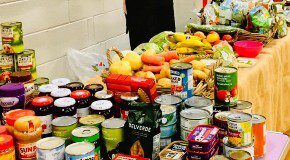
In this blog, Networks and Communications Officer Peter Williams discusses the issues of food insecurity and how some of our funded partners are responding.
For many, food is not only a staple to sustain our everyday lives but is a basic human right. Ultimately our ability to make choices about what we eat depends on our income. Unfortunately, throughout Great Britain, there are many people living in areas experiencing the highest levels of disadvantage who have limited choices or are unable to access enough food.
Food insecurity is growing, and it is contributing significantly to increased health inequalities in areas experiencing high levels of disadvantage. What this means is that many people either are forced to skip meals, eat less and/or eat poorer quality food.
The COVID-19 crisis has exacerbated food insecurities for many living on low incomes and has exposed the severity of the UK’s food poverty problem. Research from The Food Foundation found that more than three million people in Great Britain went hungry in the first three weeks of lockdown in April 2020 alone and recent data from the foundation highlights that between March 2020 and January 2021, 4.7 million adults and 2.3 million children lived in households which experienced food insecurity in the first six months of the pandemic.
The pandemic has also led to an unprecedented increase in emergency food parcels for many households, particularly for those living on low incomes. According to the Independent Food Aid network, there was a 177 per cent increase in the number of food parcels distributed to households on the lowest poverty line between May 2019 to October 2020, and although food parcel distribution isn’t as high as it was at the start of the pandemic, it’s still much higher than pre-pandemic, showing that the consequences for people are still manifesting.
A number of people that experience food poverty are people receiving Universal Credit and are in insecure jobs meaning that affording food, let alone healthy food is often a struggle. A report from the Trussell Trust found that 40 to 45 per cent of people who use food banks receive state benefits. This means that 55 per cent of people are not using food banks and are either falling through the cracks or are in in-work-poverty which is a growing area of concern.
There are a variety of barriers that prevent people from having access to healthy food, including higher costs, which can act as a barrier for many people on low incomes. As a result, lower-income households often need to turn to less healthy options, as they are more affordable. People with the lowest incomes would need to spend almost three-quarters of their disposable income on food to follow Public Health England’s healthy eating advice, compared to 6 per cent for the wealthiest 10 per cent of households.
For some households, healthier options such as supermarkets and green grocers are simply too far away from where they live. Kelloggs Foundation research has found that 1.2 million people in areas experiencing disadvantage are estimated to be living in areas where many will struggle to access affordable and healthy food, known as ‘food deserts’.
Some of our funded partners have been working hard to combat food poverty in their neighbourhoods, and many have become involved in frontline food bank work since the onset of the pandemic. One example is the Local Conversation on the Old Fold and Nest Estates in Gateshead, supported by Edberts House, which has been well known for establishing affordable food initiatives. Prior to the pandemic, they created a resident-led community kitchen, which serves a range of affordable freshly made savory snacks and meals.
During the pandemic, Lindsey Thompson, a community development organiser from Edberts House, has found new ways of supporting residents by introducing live cooking lessons on Facebook. Her innovative Facebook live sessions, Lindsey’s Kitchen, has invigorated followers by showcasing cooking webinars using affordable healthy ingredients and basic kitchen equipment. Since its launch, the Facebook group has been able to attract over 1,000 members and continues to grow.
Another project, the Tang Hall Food Co-operative, which was funded through the Trust’s Active Communities programme, was addressing food poverty by creating accessible green community spaces where local people could grow food together and have since used food to deepen community connections, expand social circles and enable skill sharing. Residents have established a food co-op for selling and swapping produce, learning cooking skills and sharing community meals. The co-op enabled local people to access fresh, healthy food locally, whilst keeping money circulating within the local community.
Food insecurity has been a major issue for those most in need since the inception of the welfare state in Britain. To effectively tackle food poverty, we must look at all the root causes which prevent people from accessing affordable and healthy food. We must explore inequality more broadly by committing to improve long lasting, stable employment and ensuring incomes meet every basic need.
Those experiencing high levels of disadvantage are disproportionately impacted including racially minoritised people, disabled people, people who identify as LGBTQ+ and women, who already face structural barriers within society. We must also support and invest in those local economies in areas experiencing high levels of disadvantage and ensure that locally owned community assets and shops are affordable and provide healthy food for all.
,
